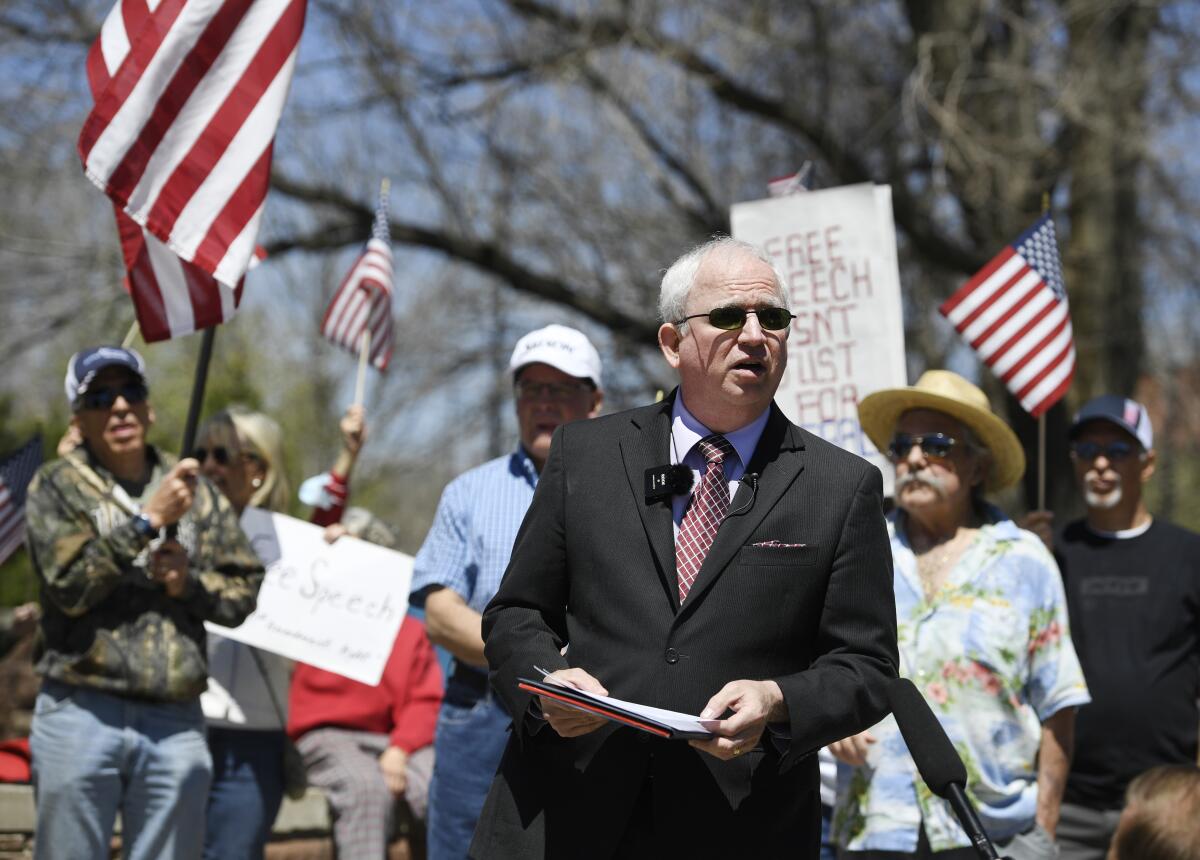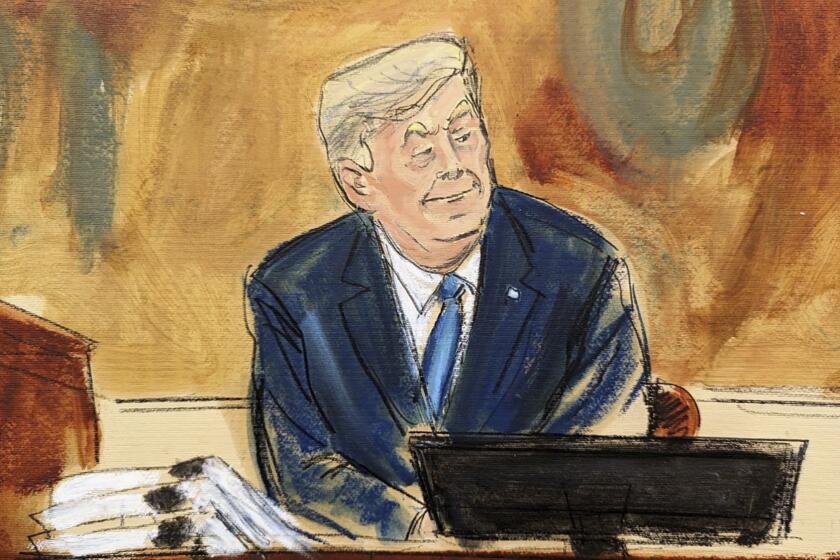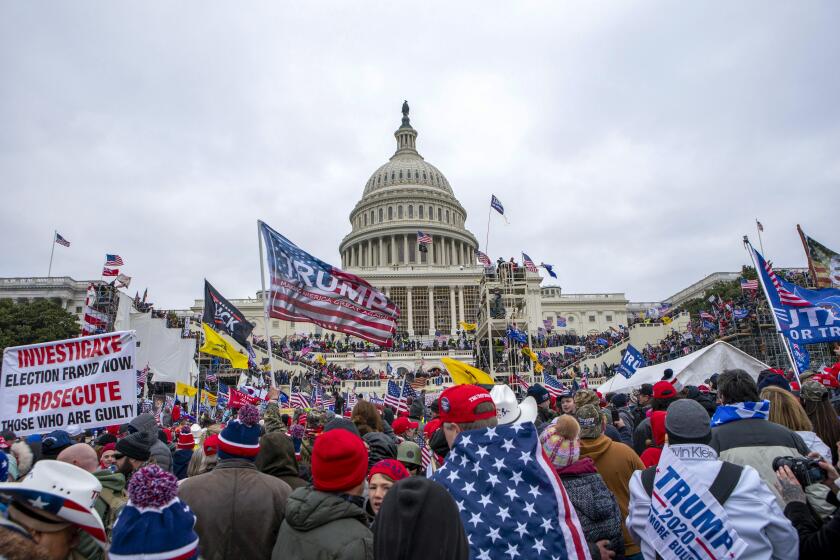Trump could try to blame his lawyers for Jan. 6. But it just got a lot more difficult

- Share via
U.S. District Judge Tanya Chutkan recently issued an adroit but little-noticed order in the federal Jan. 6 case against Donald Trump. It will probably preempt a whole lot of mischief and delay by the defendant.
Chutkan’s order last week granted prosecutors’ motion to require Trump to reveal whether he will assert an advice-of-counsel defense in the trial scheduled to begin in March. If Trump intends to blame his lawyers for his efforts to overturn the 2020 election, he has to put up or shut up by Jan. 15. He is likely to shut up.
Trump has repeatedly suggested that he relied on his attorneys’ advice in undertaking his flagrantly unconstitutional conduct after the election. Most expressly, Trump’s lawyer John Lauro claimed on “Meet the Press” in August that what his client was “indicted for, ultimately, is following legal advice from an esteemed scholar, John Eastman.” Lauro added that Trump was also following Eastman’s advice when he “petitioned Mike Pence” to refuse to certify Joe Biden’s election.
But there is a wide gulf between such a casual assertion and actually mounting an advice-of-counsel defense at trial.
Litman: Trump’s fraud trial strategy may be politically effective. But it’s legally disastrous
The ex-president insulted Justice Arthur Engoron and helped Atty. Gen. Letitia James. Ivanka Trump’s testimony looked polite and uneventful by contrast.
An advice-of-counsel defense seeks to demonstrate a lack of criminal intent based on reliance on a lawyer’s advice. A defendant asserting it must be able to show that he relied in good faith on his counsel’s advice that the course of conduct was legal — that is, not just that he received the faulty advice but that he took it to heart. And he must also show that he fully disclosed all material facts to his attorney before receiving the advice.
The latter requires a step that few defendants are willing to take: waiving attorney-client privilege and disclosing all communications that will be used to establish the defense. Beyond that, a defendant must reveal otherwise privileged communications that are relevant to proving or undermining the defense even though they won’t be used at trial.
Trump’s first obstacle in this regard is proving a bona fide attorney-client relationship with Eastman. Trump has been shifty about who his lawyers were in the critical postelection period. If he wants to blame Eastman’s counsel, he will have to show that Eastman was his lawyer with a retention letter, bills or other evidence.
Special counsel Jack Smith’s investigation yielded an indictment of the former president for his role in events surrounding the Jan. 6, 2021, Capitol riot.
Trump would then have to be an open book about the advice Eastman provided. That presents a serious problem for the former president: Eastman notoriously conceded the unsoundness of his theory about how Vice President Mike Pence could interfere with Congress’ certification of the election results. He also admitted to Pence counsel Greg Jacob that the Supreme Court could be expected to unanimously reject his crackpot idea.
Trump would further have to contend with Eastman’s own contradictory account of his advice. With the sort of dodginess that gives lawyers a bad name, Eastman has insisted that he raised various options but never expressly urged the illegal conduct Trump undertook and never even shared his notorious memos with the then-president.
Another inconvenient fact is that Eastman is facing disbarment for his false public statements about election fraud. A California judge recently made a preliminary finding that he had breached professional ethics.
We’re still not done with the obstacle course Trump would face. To assert the advice-of-counsel defense, he would also have to provide the government with otherwise privileged communications relevant to disproving the defense. That would include, for example, emphatic advice against trying to overturn the election from the likes of former Atty. Gen. William Barr, White House Counsel Pat Cipollone and the rest of “Team Normal.”
Most daunting of all, Trump would have to demonstrate that he actually relied in good faith on Eastman’s advice that his conduct was legal. I can think of only one way for him to do that: taking the stand and testifying that he did so. The ensuing cross-examination would be nothing short of brutal. (“Mr. Trump, you were repeatedly advised, were you not, that the conduct you were prodding the vice president to undertake was unconstitutional?”)
The wisdom of Chutkan’s order is that it prevents Trump from ambushing the government at trial, a stunt I have seen defendants attempt more than once. Without advance notice, nothing would prevent Trump’s lawyer from raising the claim in an opening statement or mid-trial, when it wouldn’t be feasible to litigate what Trump has to produce. Trump may try to get away with asserting the defense without meeting the requirements, but special counsel Jack Smith and Chutkan will have ample time to call him out.
Thanks to the judge’s order, Trump won’t be able to blame his lawyers for Jan. 6 without producing a wealth of otherwise privileged materials and taking the stand to testify to his own good faith. Rather than mount the defense the way the law requires, look for Trump to give it up entirely.
Harry Litman is the host of the “Talking Feds” podcast. @harrylitman
More to Read
A cure for the common opinion
Get thought-provoking perspectives with our weekly newsletter.
You may occasionally receive promotional content from the Los Angeles Times.












